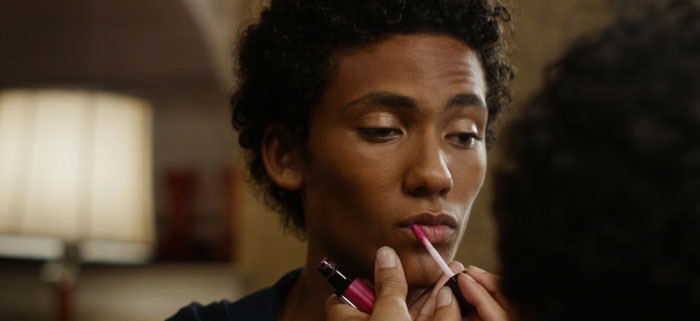By Kristy Puchko | Film | January 10, 2018

There’s something raw and magical in writer/director Damon Cardasis’s debut film Saturday Church. Not only does it unfurl a rarely told story of queer youth of color, but it does so with fragile and beautiful musical numbers, that capture the brilliant pain and exquisite joy of growing up.
Luka Kain stars as 14-year-old Ulysses, a shy, Black and gay teen eager to explore love, sex, and gender identity. However, the recent death of his father means Ulysses is expected to become the “man of the house.” His interest in wearing high heels only draws consternation from his widowed mom (Margot Bingham), ire from a ferociously religious aunt (Regina Taylor), and fear from his little brother (Jaylin Fletcher). But Ulysses finds sanctuary and a chosen family within “Saturday Church,” a program that gives shelter, food, and comfort to LGBTQ youth. Befriending gal pals Dijon and Ebony (trans actors Indya Moore and MJ Rodriguez) and a dreamy young artist (Marquis Rodriguez), Ulysses can truly be himself. There, he can envision a path from closeted altar boy, to stomping runway queen, aspiring to compete in the NYC’s glitzy ball scene.
Informed by his volunteer work, Cardasis carefully illustrates the constraints queer youth can face in religious homes, and contrasts that alongside the salvation of Saturday Church. He splashes this story across New York City’s streets, and folds in a sense of magical realism by accenting Ulysses’s big moments with vibrant flowers, strewn on subway steps, piled high in a shelter, or flanking him under the awning of a rain-soaked bodega. Similarly, we see Ulysses blossom. Kain’s physicality shifts from stiff and scared to fluid and fabulous as Ulysses practices giving face and Vogue-ing while strutting down sidewalks, and even when prepping for mass, fully decked out in his cassocks. Beyond this, 6 original songs give voice to the quiet kid’s inner-most wishes, and to the marginalized marvels around him. Together, they sing of heartbreak, resilience, hope, and love.

The first song kicks off after this effeminate kid is bullied in a boys’ locker room. As he sings, his abusers transform into his mute back-up dancers. The staging of these numbers can be clunky with the cinematography struggling in tight spaces, or dodging some less-than-stellar dancers. Other numbers fixate on a seated singer, while the soaring song yearns for a grander presentation. The lyrics themselves are to-the-point, but poignant. A particular standout comes when Ulysses and his beau relish the thrills of young love. But the performance of each is so beautiful and affecting that it smooths over this low-budget musical’s roughest edges.
Just 82-minutes long, Saturday Church is a sprint of a film. But it’s not short on big moments. Cardasis lovingly sculpts a symphony of characters, some bristling, some blithe, others snarky, sleazy, or self-righteous, but all of them compelling. His excellent ensemble deftly develops emotional beats, tugging at our hearts and hopes with a trembling agility. When Ulysses gets his first coveted kiss, my heart soared. And when he’s inevitably pitched to the streets, my heart raced to my throat, quaking for wish of his safe return home. Thankfully, this is a story of loves: self-love, romantic love, and motherly love.
Swift, sweet, and spirited, Saturday Church is a gem. Don’t miss it.
Note: the pronouns used in this review reflect those employed in the film.
Saturday Church will be hit theaters in NY & LA, and be available On Demand on January 12th.